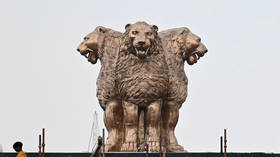19 Indian parties snub Modi over parliament building inauguration

India’s Prime Minister Narendra Modi is at the centre of a deepening row ahead of the inauguration of the new parliament building in New Delhi on Sunday, with 19 parties threatening to boycott the ceremony.
The parties are insisting that India’s President Draupadi Murmu, who is the country’s highest constitutional authority, should preside over the inauguration and not PM Modi. Opposition parties are arguing that the PM is head of the executive, while President Murmu heads the legislature.
The choice of inauguration date has also riled opposition parties, as it coincides with the birth anniversary of Vinayak Damodar Savarkar (1886-1966), who first formulated the Hindutva (Hindu nationalism) ideology currently espoused by India’s ruling Bharatiya Janata Party (BJP). Savarkar’s role in India’s freedom struggle against the British colonialists is steeped in controversy.
The opposition parties have also accused the government of insulting “our founding fathers” such as Mohandas Karamchand Gandhi, known as the Father of the Nation, as well as first PM Jawaharlal Nehru, revolutionary leader Subhas Chandra Bose, and others. Some opposition MPs argue that 26 November 2023, the 75th anniversary of the Indian constitution, would have been a more appropriate date.
On May 24, the 19 parties issued a statement announcing their “collective decision” to boycott the inauguration.
The declaration, which is seen as a rare sign of opposition unity ahead of next year’s parliamentary elections and comes in the wake of the BJP’s unexpected defeat in the recent Karnataka assembly polls, hailed the inauguration as “a momentous occasion.” It said Modi’s “decision to inaugurate the building by himself” was “a grave insult [and] a direct assault” on India's democracy, as opposition MPs had been “disqualified, suspended and muted” while “controversial legislation” was passed without debate or discussion.
“When the soul of democracy has been sucked out from parliament, we find no value in a new building,” the opposition statement added.
India's Home Minister Amit Shah, who is seen as the de facto second-most-powerful politician in India after Modi, has urged the opposition not to politicize the event.
“The government has requested all to be present. Everyone will act according to their own feelings,” he said in a press conference on the same day that opposition parties issued their statement. Some opposition parties that hold regional power, such as the Biju Janata Dal (BJD) in Odisha and the YSR Congress Party (YSRCP) in Odisha and Andhra Pradesh, respectively, will attend the ceremony.
On Friday, India’s Supreme Court cleared the decks for Modi to inaugurate the parliament building, turning down a public interest litigation calling for the inauguration to be led by President Murmu instead.
The building was designed by HCP Design, Planning and Management and constructed by Tata Projects at an estimated cost of 9.7 billion rupees ($117.1 million). The old parliament building, a historic landmark of New Delhi, was inaugurated on January 18, 1927 by then-Viceroy Lord Irwin. The new one is part of the Modi government’s ambitious project to revamp the Central Vista, New Delhi’s administrative area. The project, estimated to cost around $1.6 billion and likely to be completed by 2026, has incurred the wrath of the opposition, environmentalists and civil society groups alike since it was announced.













